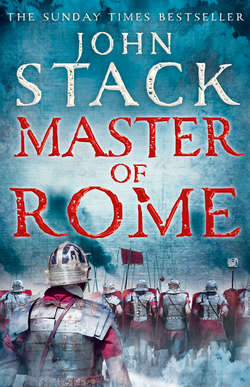Читать книгу Master of Rome - John Stack - Страница 5
TUNIS, NORTH AFRICA. 255 BC
ОглавлениеThe colossal animal surged forward against the crack of the bullwhip, its momentum increasing into an unstoppable charge as it bellowed in anger and terror, the scent of men fuelling its rage. It lifted its head and gazed ahead through hooded yellow eyes. The scene before it was a blur of movement, a dark horde that threw up a terrifying wall of sound; the hammering of ten thousand shields, the war cries of a multitude. The elephant bellowed once more, sweeping its scimitar-shaped tusks high into the air as the whip cracked against its hide.
The ground beneath the beast trembled and shook. Dust smothered its throat, the thirst maddening, while slowly the host before the creature drifted into focus, the mass into individual men. A sharp pain shot through the elephant’s flank and it immediately turned its head to the site of injury, the blood stark against the grey hide. Every instinct called for flight, but years of brutal training demanded obedience and the bullwhip drove the creature on.
The elephant crashed headlong into a wall of shields and the war cries of men changed to screams of pain, the momentum of the creature’s charge driving it deep into the Roman maniples. The legionaries struck out with shield and sword while overhead volleys of spears rained down to strike deep into exposed flesh, the unceasing pain driving the elephant into frenzied terror. The creature swept its tusks before it, scything through the massed ranks, cutting through flesh and armour. It raised its trunk, a spray of pink blood gushing forth from the fluid filling its punctured lungs, while its feet crashed down on the fallen, crushing bone and cartilage as the death cries of man and beast filled the air.
The Roman line buckled and caved before the momentum of the elephant charge was absorbed and then slowly repelled, the strength of twelve thousand legionaries pitted against the might of a hundred elephants. The front ranks shattered but fought on, the inescapable fight driving them to mindless courage, with men standing their ground against creatures that killed and maimed relentlessly until the burden of countless wounds drove them to their knees. Those who remained advanced against the Carthaginian phalanx that shadowed the elephant attack, but again the Romans were checked as cries of alarm swept across their lines.
The Carthaginian horse, four thousand strong, raced across the open ground, the routed Roman cavalry in their wake, the light-horsemen loosing spears at full gallop into the exposed Roman right flank. The maniples turned to engage. The centre became a confusion of commands and alarm as the enemy cavalry swept around the rear of the Roman formation. The legions ceased to advance, the fight on all sides. The order to ‘steady the line’ was given, a desperate command to stand fast, to take strength and fight against all odds.
The Carthaginians pressed inward, the cavalry driving their mounts ever on against upturned shields, the riders striking down with spear and sword. The maniples stepped back, the fallen trampled under hoof as legionaries struggled to wield their swords in the crush, the men to their rear unable to assist as the battle descended into butchery. In the centre, desperate commanders roared hopeless orders, the ever-tightening vice robbing them of the chance to break out while the battle line closed in from all sides, the Carthaginians advancing relentlessly, giving no quarter, their hatred for the Roman invader feeding their strength and determination as warriors pushed forward to fight in the front line, eager to bloody their swords, the pressure on the Roman lines never abating until the last man fell under Phoenician steel.
